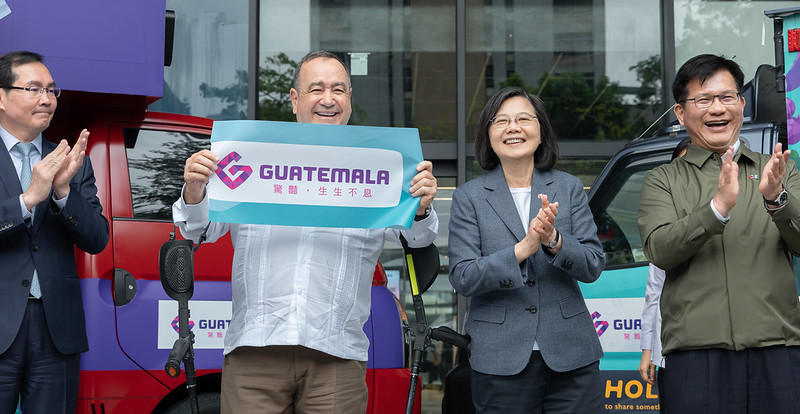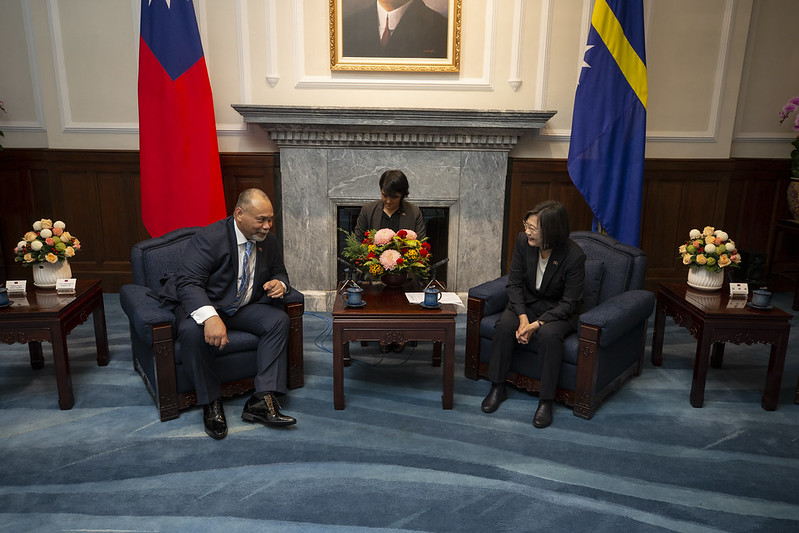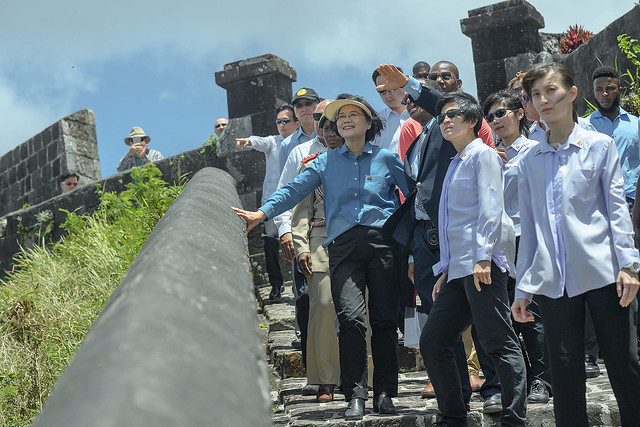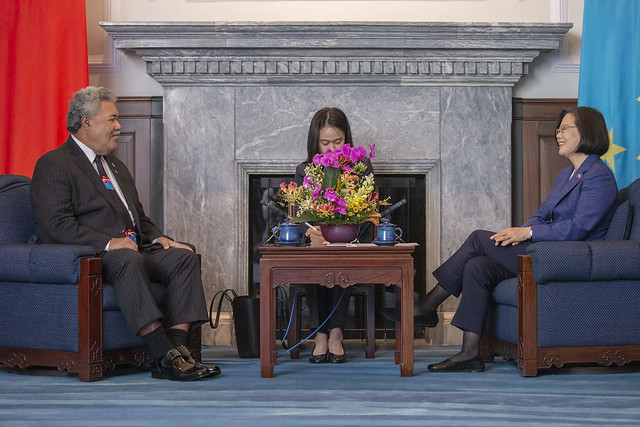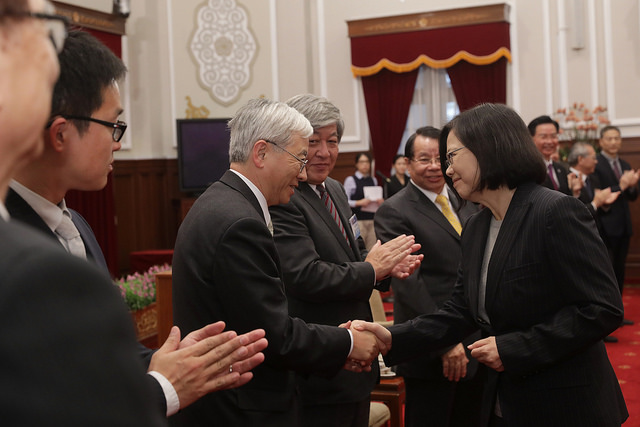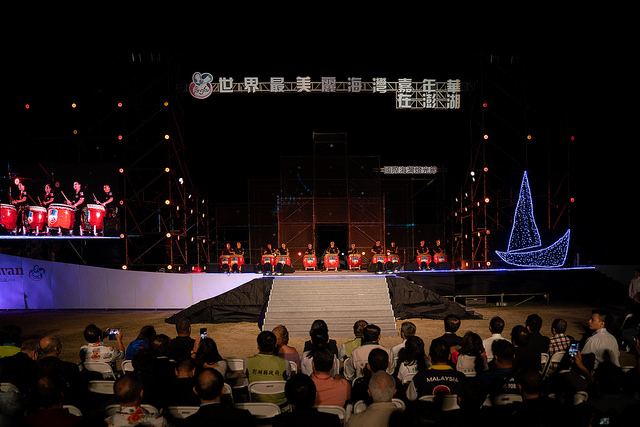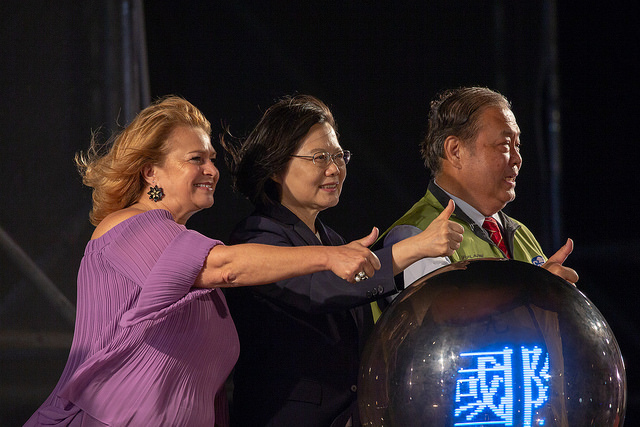News & activities
 News releases
News releases
On the evening of September 27, President Tsai Ing-wen attended the opening ceremony of the Most Beautiful Bays in the World Carnival in Penghu, an offshore island of Taiwan. She recognized the efforts of Penghu County Magistrate Chen Kuang-fu (陳光復) and the county government in promoting sustainable tourism. The president also expressed hope that through these carnival activities Taiwan can exchange experiences in promoting sustainable tourism with friends from around the world, and they can get some sense of Taiwan's hard work and perseverance in promoting sustainable development.
In remarks, President Tsai stated that she was very happy to be in Penghu to celebrate this great event with everyone there. A memory of Penghu's natural beauty is etched in the minds of all Taiwanese, she said, and that image of beauty is now acknowledged around the world. After extensive efforts for many years, Penghu finally joined the international NGO "The Most Beautiful Bays in the World" (MBBW). And thanks to the perseverance of the Penghu County Government, the organization has also decided to hold its annual world congress in Penghu. We have expanded that event into a "Most Beautiful Bays in the World Carnival," so we welcome good friends from around the world to join us, so that we can experience the beauty of Penghu together.
The president stated that becoming the host of this international event shows how Penghu has earned worldwide recognition for its success in such areas as ocean restoration, tourism development, and renewable energy. So she congratulated the County Government of Penghu led by Magistrate Chen, and thanked them for their efforts.
The president mentioned that Penghu includes more than 90 islands with a rich variety of topographical features, culture, and scenery. Each of them—be it Penghu's basalt formations, the Double-Heart Stone Fish Trap that attracts tourists so much, or the Jibei Spit sand peninsula—all leave visitors with indelible memories. No one who has been to Penghu ever forgets its blue sea and skies, glorious beaches and sunsets, and wide variety of water and underwater activities. Penghu is like a natural history textbook, allowing travelers to feel the pulse of the ocean and the breath of life.
Since taking office, Magistrate Chen has taken active measures to revive Penghu's coral reefs. Clearing fishing nets from the seabed has created a better environment for marine life and helped make ecotourism a new hope and asset in the development of Penghu's tourism industry. Through the efforts of Magistrate Chen and the county government, Penghu has made great progress in managing marine pollution and developing renewable energy.
President Tsai commended that Penghu County's efforts to promote sustainable tourism have placed much emphasis on protecting the natural environment and ecosystem. The county government has maintained the local culture, history, and way of life, and remained committed to balancing economic development and ecological protection. This has contributed a great deal to the UN Sustainable Development Goals (SDGs), which is something we are actively pursuing. She also hopes that friends from around the world can take advantage of this opportunity to get some sense of Taiwan's hard work and perseverance in promoting sustainable development.
Even though Taiwan is not a member of the UN, President Tsai emphasized, we continue to work hard and seek opportunities to cooperate on the UN SDGs. This shows that Taiwan is a responsible member of the international community, and that our determination to engage with the world and strengthen Taiwan's global connections has never faltered.
The president pointed out that this 45-day carnival covers a rich variety of activities, including the Worldwide Ocean Cities Exposition, the 2018 Penghu Lights Festival, and the Bay Landscape Art Festival, as well as colloquiums on climate change and marine debris treatment systems. She said that we look forward to exchanging experiences in promoting sustainable tourism with other countries.
In closing, on behalf of the people and government of Taiwan, President Tsai welcomed friends from around the world as they experience Penghu for themselves, and fall in love with these islands. She also wished the 2018 Most Beautiful Bays in the World Carnival the very best of success.
The president and other distinguished guests then jointly initiated the opening ceremony and took in splendid performances.
Also attending the event were National Policy Advisor to the President Chi Cheng (紀政), Minister of Transportation and Communications Wu Hong-Mo (吳宏謀), Penghu County Magistrate Chen Kuang-fu, Legislator Yang Yao (楊曜), retired Ambassador Michel Ching-long Lu (呂慶龍), and MBBW World President Maria das Dores Meira.
